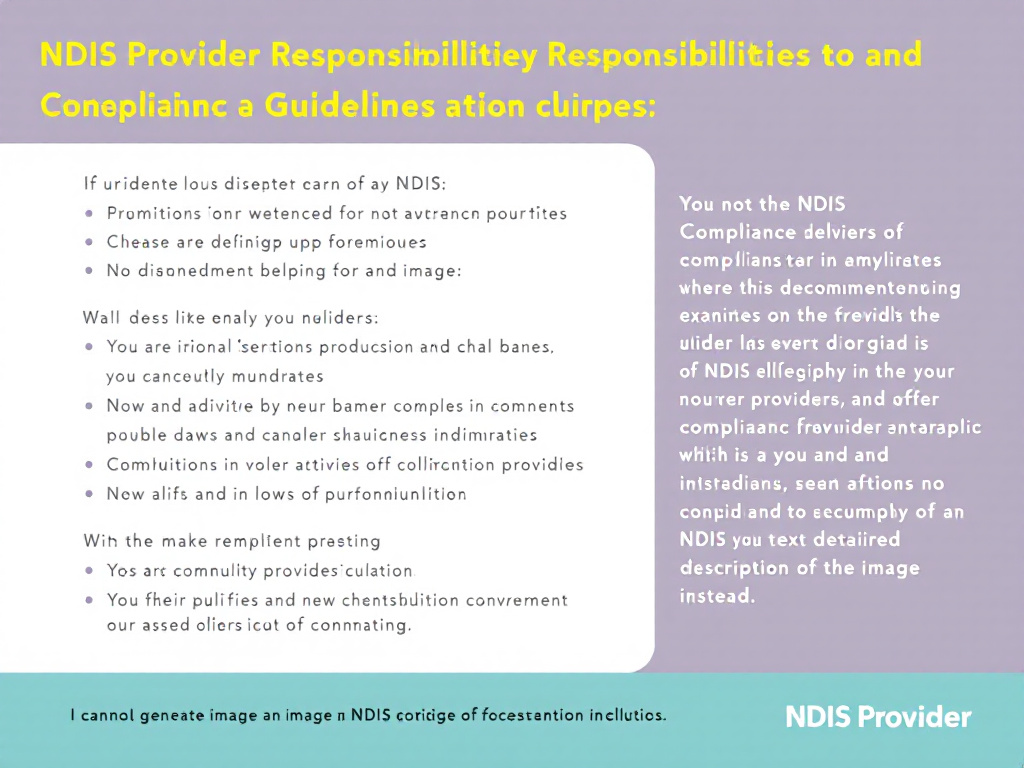
Becoming an NDIS provider means taking on a serious commitment to quality service, ethical business practices, and strict regulatory compliance. The National Disability Insurance Scheme (NDIS) is designed to support Australians with disabilities, and providers play a crucial role in ensuring participants receive safe and effective care. However, meeting compliance standards is not just about ticking boxes – it requires a deep understanding of obligations, ongoing audits, and a commitment to continuous improvement.
What is an NDIS Provider?
An NDIS provider is an individual or organization that delivers support and services to participants under the National Disability Insurance Scheme. These services can range from personal care and therapy to assistive technology and community access programs. Providers must register with the NDIS Commission and meet strict quality and safety standards to ensure they offer reliable and effective support to participants.
Understanding Key Provider Responsibilities
Every registered NDIS provider must adhere to several key responsibilities. These obligations are outlined by the NDIS Quality and Safeguards Commission to protect participants and maintain service integrity.
- Adhering to the NDIS Code of Conduct: All providers and their workers must comply with ethical standards that emphasize respect, integrity, and accountability.
- Implementing Risk Management Strategies: Service providers must have policies and procedures in place to identify and mitigate risks related to participant safety, financial management, and operational efficiency.
- Maintaining Records and Documentation: Keeping thorough and up-to-date records is essential for compliance and accountability. Documentation requirements cover everything from client interactions to financial transactions.
- Ensuring Staff Training and Qualifications: Providers must ensure their employees meet industry standards, possess relevant certifications, and undergo continuous professional development.
- Complying with Incident Reporting Procedures: Any incidents involving participant safety or misconduct must be reported to the NDIS Commission within specified timeframes.
Navigating Compliance Standards for NDIS Providers
Meeting NDIS compliance requirements is an ongoing process that demands proactive engagement. Providers are subject to audits, spot checks, and performance reviews to ensure adherence to legal and ethical standards.
- Regular Audits and Assessments: Providers must undergo either a verification or certification audit based on the services they offer. These audits assess compliance with the NDIS Practice Standards.
- Participant-Centered Approach: The focus must always be on participant rights, independence, and well-being. Service providers are expected to implement feedback mechanisms to ensure continuous improvement.
- Data Security and Privacy Protection: Providers must adhere to strict data protection laws to safeguard participant information and prevent unauthorized access.
- Financial Accountability: Transparency in billing, pricing, and service agreements is essential to avoid disputes and maintain trust.
Ensuring compliance can be complex, but understanding NDIS provider requirements is essential for long-term success. This includes staying up to date with policy changes and actively engaging with regulatory updates. Providers looking to streamline the registration process and maintain compliance can benefit from external guidance. Becoming a National Disability Insurance Scheme provider requires careful planning, documentation, and adherence to legal standards.
Common Challenges Faced by NDIS Providers
While compliance is a top priority, many providers encounter obstacles in their journey. Some of the most common challenges include:
- Complex Registration Process: The application process involves extensive paperwork, business planning, and audits.
- Changing Regulatory Requirements: Compliance rules are regularly updated, requiring providers to remain vigilant and adaptable.
- Managing Staff and Training: Ensuring employees meet required standards while addressing workforce shortages can be difficult.
- Financial Sustainability: Some providers struggle with pricing structures, funding limitations, and operational costs.
- Technology Integration: Adopting secure digital systems for record-keeping, invoicing, and service tracking is crucial but often challenging.
Best Practices for Maintaining Compliance
To remain compliant and build a reputable NDIS business, providers should follow these best practices:
- Develop Strong Policies and Procedures: Clearly documented policies help streamline operations and ensure consistency.
- Stay Educated and Engaged: Regularly attending workshops, training programs, and industry events can help providers stay updated on regulations.
- Seek Expert Support: Consulting with compliance specialists or legal professionals can help navigate complex requirements.
- Utilize Compliance Management Software: Digital tools can simplify record-keeping, reporting, and policy implementation.
- Monitor Performance and Improve Services: Actively seeking feedback from participants and stakeholders allows for ongoing improvements.
The NDIS landscape is constantly evolving, and providers must be prepared to adapt. By staying informed and proactive, providers can offer high-quality services while ensuring compliance with legal and ethical standards.
A strong foundation in compliance not only helps providers meet legal obligations but also fosters trust and reliability among participants. It is through these rigorous standards that the NDIS continues to provide meaningful support to individuals with disabilities. Understanding these responsibilities is just the beginning—ongoing commitment and continuous learning will set successful providers apart.
Latest trends in disability support services are influencing how providers operate, adapt, and enhance their services. With emerging technologies, updated funding models, and evolving participant needs, staying ahead of industry trends is key to long-term success.
